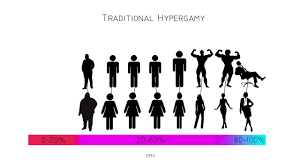HYPERGAMY: THE ACT OF MARRYING UP.
- Omoye Ohiku

- Feb 2, 2021
- 3 min read
Hypergamy is a tern used in social science for the act or practice of a person marrying a spouse of higher caste or social status than themselves. The antonym is "hypogamy" which refers to the reverse: marrying a person of lower social class or status.
So, in other words, hypergamy is marrying up, while hypogamy is marrying down. Akin to the notion of "serial monogamy" acknowledged by the mainstream culture, hypergamy is the savage natural instinct that finds it's in between.
We all have a list of qualities that we look for in a potential partner. Most of us want someone who’s smart, funny, and attractive, just to name a few. But some folks actively seek out partners of a higher socioeconomic or social class (i.e., partners who are rich and powerful). This practice is known as hypergamy.
Hypergamy, which in essence means “marrying up,” actually stems from Hindu tradition, The term was coined in the 19th century when translating classical Hindu law books from Sanskrit to English. it defines the word as “the practice among Hindu women of marrying into a caste at least as high as their own.”
Today, the term is used in anthropological discourse and pertains to all societies and cultures. Marrying someone just because they're rich might seem shallow or unethical, but Fisher says it's evolutionarily adaptive to engage in hypergamy, because it increases the likelihood that you’ll have children who live long enough to reproduce. At the dawn of human history, it was clear why women engaged in hypergamy: “Hundreds of thousands of years ago, you wanted a man who had more resources, land, or his own watering hole. A man with resources is better suited to help you raise your children,” Dr Helen Fisher explains.
Anthropological research indicates hypergamy still happens today—even if watering holes are largely out of the equation. A widely-cited 2016 paper explored the income difference between couples in 1980 and 2012. Even though women are now as educated as men, especially younger generations, researcher Yue Qian noted "the tendency for women to marry men with higher incomes than themselves persisted.” Even women who married a man of a lower education level still married a man who made a higher income.
Fisher says women may gravitate toward men with money so they can provide better food, healthcare, protection, and education for their children. Money, however, isn’t the only way to achieve these things. Having social clout can be enough to provide these resources too, which is why hypergamy includes class and status.

She says men marry up, too, although researchers tend to observe it in different ways. "Men want a woman who they find attractive, and there’s an evolutionary underpinning (in part) to what men deem attractive,” says Fisher. “Attractiveness, in this context, means that these women show signs of health, youth, and fertility.” That’s why many men will marry down in social class for someone with superior looks.
Of course, hypergamy isn't just some harmless byproduct of evolutionary biology. It also has to do with the way that society is specifically structured to keep women from achieving financial equality. Think of it like this: Historically, women haven't had the same access to education and career opportunities—still, there's a glass ceiling in many male-dominated professions like engineering, tech, and others. Because of this, women have been forced to rely financially on men.
While many Western societies have progressed to promote gender equality in the past century—attempting to creating equal career, educational, and financial opportunities for women—there's still a large gender pay gap. For example, in the United States, women are paid roughly 82 cents for every dollar a man makes for the same job, and the disparity is even greater for women of color, according to the American Association of University Women.
While hypergamy may be a factor in many long-term relationships, But wealth and status obviously aren't the only things people look for in a spouse. According to Fisher, who also conducts the Match.com “Singles in America” study, “Ninety-five percent of people in the study say that they want someone who respects them, somebody who they can trust and confide in, and makes them laugh, and has time for them.”
While hypergamy may be a factor in many long-term relationships, "really, people today are looking for love," Fisher says. "Money and status is secondary.















Information is key!
Thank you.It’s so informative
Thanks Aje.
Very very informative!